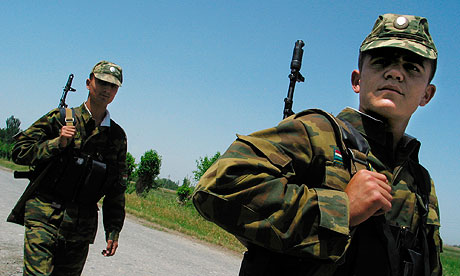
Security Situation in Tajikistan Deteriorates After a Bold Prison Escape
Publication: Eurasia Daily Monitor Volume: 7 Issue: 168
By:

Tajikistan faces a deteriorating security situation following the escape of 25 high-profile prisoners from a detention center in Dushanbe run by the State Committee for National Security (GKNB) on August 23. The convicts escaped less than one week after they had been sentenced to lengthy terms in prison on charges related to terrorism and drug trafficking. Some of the escapees reportedly have ties with the Islamic Movement of Uzbekistan (IMU), designated by the US State Department as a terrorist group, and rebel militants in Russia’s North Caucasus republics (www.asiaplus.tj, www.khovar.tj, August 23).
According to the justice ministry, the escape occurred due to the “negligence” of GKNB guards. The ministry claims that an inmate, former Guantanamo detainee, Ibrohim Nasriddinov, killed one of three guards at the detention center, seized another two guards and opened all the cells. Afterwards, the 25 convicts stole firearms and escaped, killing another four guards (Nigoh, September 2).
Immediately after the escape, Tajik security agencies were placed on high alert and additional checkpoints were set up on major roads and at airports. The government also dispatched sizable military units to the Romit gorge, near Dushanbe, where the escapees abandoned the cars they had used to flee from the capital. The gorge that houses multiple resorts has been closed to visitors due to a security operation there. On September 7, Tajik security agencies reported that an army officer was killed in the gorge in a skirmish with the fugitives (www.asiaplus.tj, September 7).
Although Tajik security agencies recaptured seven of the 25 fugitives, including Ibrohim Nasriddinov, several incidents led to a further deterioration of the security environment in the country. On September 3, two suicide bombers in a car packed with explosives crashed into a police station in Khujand, the administrative centre of northern Sughd province. The blast killed two police officers and wounded about 28 others. Tajikistan’s Ministry of Internal Affairs (MIA) said they suspected that the IMU was behind the attack (Asia Plus, September 7).
Tajik security services have reported that one day before the bold prison escape, on August 22, they detained two alleged members of “radical Islamist groups” with remotely controlled improvised explosive devices (IED’s). The two bombers were captured in the south-western part of Dushanbe where Russian troops are stationed (www.asiaplus.tj, August 24). It is not known how the detainees planned to use the explosives and whether their plans were related to the prison escape or the suicide bombing in Khujand.
On September 8, a previously unknown Islamic group, Jamaat Ansarullah in Tajikistan, claimed responsibility for the bombing in Khujand. The group’s statement on an Islamist website frequently used by rebels in Chechnya said the attack was carried out “in response to the killing and humiliation of our brothers and ordinary Muslims, which took place behind the walls of this building accursed by Allah” (www.kavkazcenter.com). Although many experts, including the deputy head of Tajikistan’s Islamic Revival Party, Umarali Hisaynov, doubt whether Jamaat Ansarullah exists, the statement reflects a growing frustration with the Tajik government’s increasingly harsh policies towards non-conventional Islamic movements. In the first eight months of this year alone, Tajik security agencies jailed more than 100 members of banned Islamic organizations (www.asiaplus.tj, September 11).
Two days after the suicide bombing in Khujand, on September 5, five people were wounded as an IED detonated in a nightclub in Dushanbe. Tajik security agencies blamed the blast on “young, religious people,” saying it was most probably planned as a punishment of the management of the nightclub, known as a center of prostitution, for continuing its business during the Muslim fasting month of Ramadan (www.asiaplus.tj, September 6).
Finally, on the night on September 11, an unknown armed group attacked a police station in the Rudaki district, east of Dushanbe. According to Tajik police, the assailants retreated after a three-hour exchange of gunfire. Although the motives behind the attack are unclear, police suspect that the assault was an attempt to seize firearms (www.regnum.ru, September 12).
While the separate events in Dushanbe, Khujand and Rudaki might be unrelated, they demonstrate that Tajik security agencies are increasingly unable to cope with the security challenges facing the country. Tajik President, Emomali Rakhmon, on September 2, sacked the head of the GKNB amidst growing calls for radical security sector reform to make law-enforcement agencies more efficient and transparent (Shabakai Yakum TV, September 2). Whether President Rahmon’s government will be willing to implement such reforms and prove able to cope with the challenges presented by increasingly radicalized Islamic groups in the country remains to be seen.




